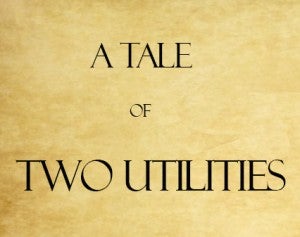By Dick Munson
As a utility executive, it is the best of times, it is the worst of times. It is the age of innovation, it is the age of stagnant tradition. With a nod to Charles Dickens, it is the epoch of environmental improvement, it is the epoch of continued pollution.
Perhaps no state better represents those extremes than Illinois, where Commonwealth Edison (ComEd) in the north is considering new business models and embracing greenhouse-gas reductions, while Ameren in the south is rejecting change and virtually anything related to clean energy. 
Consider energy efficiency. ComEd thinks it makes electricity planning easier and wants to invest aggressively. Recent negotiations suggest Ameren prefers to scale back its existing commitments.
Rejecting efficiency is not just an affront to the lungs of Ameren’s customers – since cutting energy waste reduces the need to burn dirty coal – it also drains the pocketbooks of the southern Illinois utility’s consumers, because efficiency is by far the cheapest means to ensure reliable electricity.
Consider also customer access to energy data. ComEd has worked with Environmental Defense Fund (EDF) and Citizens Utility Board (CUB) to adopt the Open Data Access Framework, which empowers people to understand how they can reduce their bills through better energy management. Ameren argues consumers shouldn’t have access to their own data.
Rejecting data access is not just an affront to transparency, but it retards efficiency, since studies show that informed consumers reduce their energy use when power is expensive.
Consider, moreover, the calculation of greenhouse-gas reductions. ComEd has adopted an EDF-CUB metric for evaluating how utility investments reduce pollution. Ameren wants to delay its adoption.
Rejecting performance metrics is an affront to basic business economics, which maintains companies should be rewarded relative to how they reach their goals. Rebuffing measurements also harms Ameren’s customers, who must continue to buy power from the utility without any guarantee the company will reduce pollution.
The introduction and rapid advance of new technologies – including sophisticated sensors, smart electric meters, and advanced communications – offers enormous opportunities to increase and improve energy services. ComEd feels these innovations require changes to the utility business model, which for the past several decades featured risk-adverse and inefficient monopolies. The northern Illinois firm sees the potential for moving from a pipeline business – which simply pushes electrons through its wires – to a dynamic platform, which would profit by enabling entrepreneurs and others to help supply both power and new amenities.
Ameren, in contrast, seems trapped in the past, hoping it can ignore new technologies, as well as new economics that favor efficiency and clean energy. Such a backward-focused approach may be more comfortable for executives who are accustomed to guaranteed profits, but it will ultimately hurt the utility as new firms invest in innovation and customers adopt efficiency and distributed energy resources.
The power sector is changing. No doubt EDF will continue pushing ComEd to be more aggressive in its clean energy efforts, but in the meantime, we’re happy to see the utility embracing emerging technologies as a business opportunity. Ameren executives, in contrast, hope they can ignore the desires of their customers, the needs of the environment, and the challenges of new competitors. While no one claims to know with certainty what the future holds, one Illinois utility is willing to look forward; the other is stuck in the status quo.
Enviroshop is maintained by dedicated NetSys Interactive Inc. owners & employees who generously contribute their time to maintenance & editing, web design, custom programming, & website hosting for Enviroshop.
